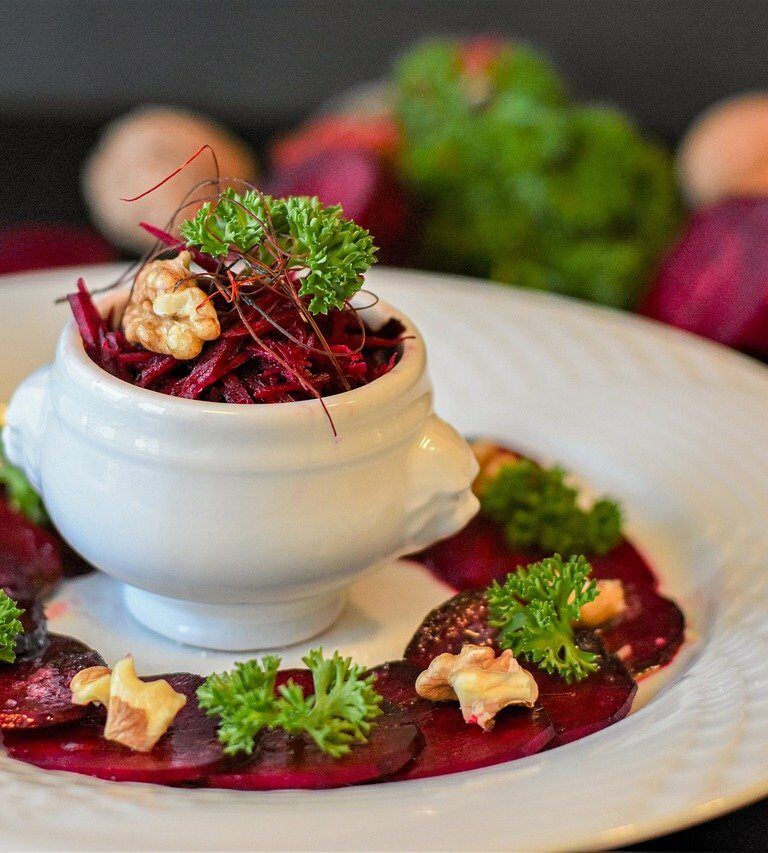Ljudska bića su već dugo vremena najorganiziraniji i najuspješniji predatori i mesožderi koji su ikada hodali ovom zemljom – pa ipak, svjedočimo kontinuiranom porastu prakse vegetarijanstva, osjećaju odgovornosti za ovaj planet. Mnogi ljudi biraju vegansku ili vegetarijansku prehranu prvenstveno iz zdravstvenih ili etičkih razloga, dok i tematike zaštite okoliša i neodrživosti današnje mesne industrije postaju sve relevantnije i prisutnije. Ali postoje i spiritualni razlozi kao povod vegetarijanstvu.
In a growing culture of compassion for other forms of life, the Jains of India have long been in the vanguard. Jaina ecological philosophy is virtually synonymous with the principle of ahimsa (non-violence) which runs through the Jaina tradition like a golden thread. Ahimsa is the principle of compassion and responsibility, practised not only towards human beings, but towards all animals and nature. In their use of the earth’s resources, Jains take their cue from “the bee that sucks honey in the blossoms of a tree without hurting the blossom, while strengthening itself.” For them there is no virtue greater than reverence for life – as a highly evolved form of life, human beings are seen to have a great moral responsibility in their relationship with the rest of our planet.
A further interesting viewpoint favouring both vegan and vegetarian nutrition is demonstrated in the lifestyle of many practitioners of meditation and supported by a persuasive body of spiritual teachings. Here, a plant based diet is seen as both a positive next step and fast-track in our spiritual evolution.
Historically, a number of humanity’s most respected meditation masters have taught that our diet has an impact on the development of our consciousness– the clarity or restlessness of our minds, the expansion and refinement of awareness and the functioning of our subtle body and nerves.
Many health and healing disciplines have their own language to describe this phenomenon –Ayurvedic medicine, for example, talks about the rajasic, tamasic and sattvic qualities of food – but in the realm of meditation diet can and does significantly alter the depth and subtlety of our experiences and the purification of our entire being.
In 1974 the late meditation teacher Sri Chinmoy wrote a popular book called The Color Kingdom which identified the spiritual  qualities and properties of specific colours. It described at length the principle that everything in the physical world – even colour – carries a specific vibration, energy and consciousness which in some way shapes our experiences in life. By extension and even more powerfully, the food we eat significantly adds to or subtracts from the quality of our inner spiritual life and impacts on the subtle world of our consciousness.
qualities and properties of specific colours. It described at length the principle that everything in the physical world – even colour – carries a specific vibration, energy and consciousness which in some way shapes our experiences in life. By extension and even more powerfully, the food we eat significantly adds to or subtracts from the quality of our inner spiritual life and impacts on the subtle world of our consciousness.
Comments spiritual teacher Sri Chinmoy, whose 7,000 meditation students worldwide all follow a vegetarian and often vegan diet:
“I wish to say that it is always advisable, if possible, to have a vegetarian diet in order to further one’s progress in the inner disciplines.
The vegetarian diet plays a most important role in the spiritual life. Purity is of paramount importance for an aspirant. This purity we must establish in the physical, the vital and the mental. When we eat meat and fish, the animal consciousness enters into us – our nerves become more agitated and restless, and this can interfere with our meditation. But the mild qualities of fruits and vegetables, on the other hand, help us to establish in our inner life as well as in our outer life, the qualities of sweetness, softness, simplicity and purity. So, if we are vegetarians, it helps our inner being to strengthen its own existence. Inwardly, we are praying and meditating; outwardly, the food we are taking from Mother Earth is helping us too, giving us not only energy but also aspiration.”
“At one time the animal consciousness was necessary for forward movement. If we had not had animal qualities, we would have remained inert, like trees, or we would have remained in the stone consciousness where there is no growth or movement. But the animal consciousness also contains many unillumined and destructive qualities. Now we have entered into the spiritual life, so the role of the animal consciousness is no longer necessary in our life. From the animal consciousness we have entered into the human consciousness and now we are trying to enter into the divine consciousness.”
Many people feel that eating meat gives them strength and nutrients unavailable to people on a vegetarian diet. But nutritional research does not support this view – indeed, a growing body of credible research supports the opposite point of view. Often, too, even one’s ideas about meat – the power of the mind! – confer strength. But as Sri Chinmoy comments,
“It is not meat but the spiritual energy pervading one’s body that gives one strength. That energy comes from meditation as well as from proper nourishment. The strength that one can get from aspiration and meditation is infinitely more powerful than the strength one can get from meat.”
“As a general rule, it is always advisable to be a vegetarian because we are trying to throw away the animal qualities and propensities from our nature. Already when we go deep within, we see that we have two different qualities or natures; the divine and the undivine. The undivine is the animal in us and the animal within us will always be aggressive and destructive. The divine in us will always be progressive and illumined. So if we want to march and run towards our Goal, then we have to do away with our animal life. To do that, whatever animal qualities we take into us in the form of meat or in some other form have to be discontinued.”
These comments explain why many spiritual paths encourage a vegan or vegetarian diet – if we are to make an evolutionary jump, develop more purity in the mind, a deepening understanding of our oneness with the intricate ecology of the planet, and from this a greater compassion for all living things, then the impact of our diet in the refinement of our consciousness is critical.
